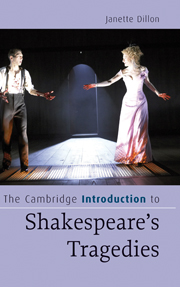Book contents
- Frontmatter
- Contents
- Acknowledgements
- Introduction
- Chapter 1 Tragedy before Shakespeare
- Chapter 2 Titus Andronicus
- Chapter 3 Romeo and Juliet
- Chapter 4 Julius Caesar
- Chapter 5 Hamlet
- Chapter 6 Othello
- Chapter 7 Timon of Athens
- Chapter 8 King Lear
- Chapter 9 Macbeth
- Chapter 10 Antony and Cleopatra
- Chapter 11 Coriolanus
- Notes
- Index
Chapter 1 - Tragedy before Shakespeare
Published online by Cambridge University Press: 05 August 2015
- Frontmatter
- Contents
- Acknowledgements
- Introduction
- Chapter 1 Tragedy before Shakespeare
- Chapter 2 Titus Andronicus
- Chapter 3 Romeo and Juliet
- Chapter 4 Julius Caesar
- Chapter 5 Hamlet
- Chapter 6 Othello
- Chapter 7 Timon of Athens
- Chapter 8 King Lear
- Chapter 9 Macbeth
- Chapter 10 Antony and Cleopatra
- Chapter 11 Coriolanus
- Notes
- Index
Summary
The First Folio collected edition of Shakespeare's Works, published in 1623, seven years after his death, grouped his plays under three headings: comedies, histories and tragedies. To spectators and readers of Shakespeare now, those three terms are so familiar as to be almost impossible to imagine doing without; but this was not the case in 1623, when ‘comedy’ and ‘tragedy’ had been terms denoting types of plays for only a century or so in England, and ‘history’ in this sense, as a dramatic genre, was very new indeed. Samuel Johnson was of the opinion that neither Shakespeare nor ‘[t]he players, who in their edition divided our author's works into comedies, histories and tragedies, seem … to have distinguished the three kinds by any very exact or definite ideas’; and the evidence of the First Folio itself, with its classification of Cymbeline as a tragedy and its heading of Richard III, grouped with the histories, as The Tragedy of Richard the Third, confirms Johnson's view.
The terms ‘comedy’ and ‘tragedy’ in English usage were first applied to narrative poems with happy or unhappy endings respectively. (The words are both of Greek origin, reaching English via Old French from Latin.) The earliest citation for both terms in the Oxford English Dictionary is from Chaucer's Troilus and Criseyde, written before 1388; and Chaucer also offered a definition of ‘tragedy’ in the Prologue to The Monk's Tale.
Go, litel bok, go, litel myn tragedye,
Ther God thi makere yet, er that he dye,
So sende myght to make in som comedye!
Geoffrey Chaucer, Troilus and Criseyde, Book V, lines 1786–8
Tragedie is to seyn a certeyn storie,
As olde bookes maken us memorie,
Of hym that stood in greet prosperitee,
And is yfallen out of heigh degree
Into myserie, and endeth wrecchedly.
Geoffrey Chaucer, Prologue to The Monk's Tale
‘Tragedies’ in this period were primarily stories about the falls of princes (sometimes referred to via the Latin as de casibus tragedy).
- Type
- Chapter
- Information
- Publisher: Cambridge University PressPrint publication year: 2007

